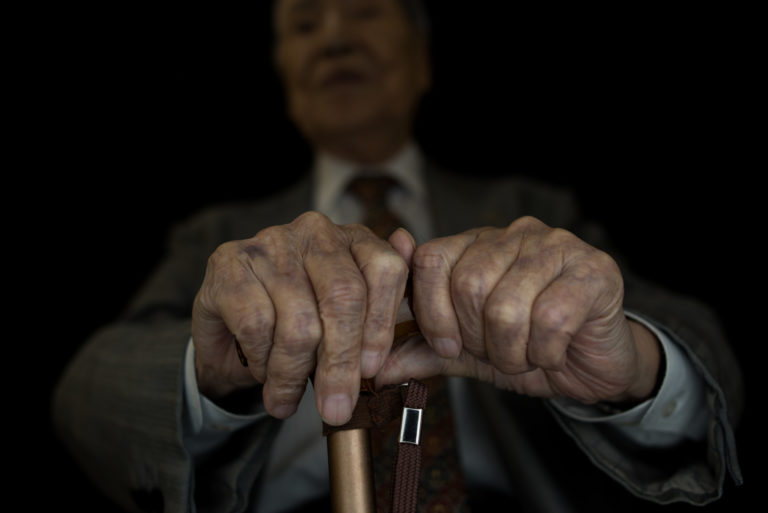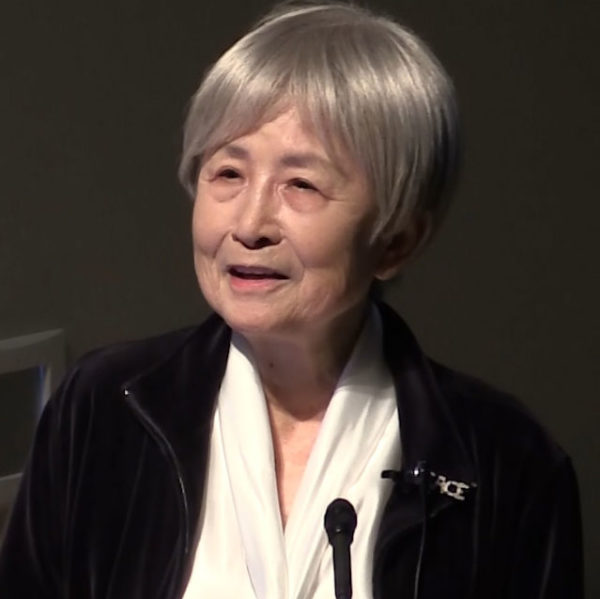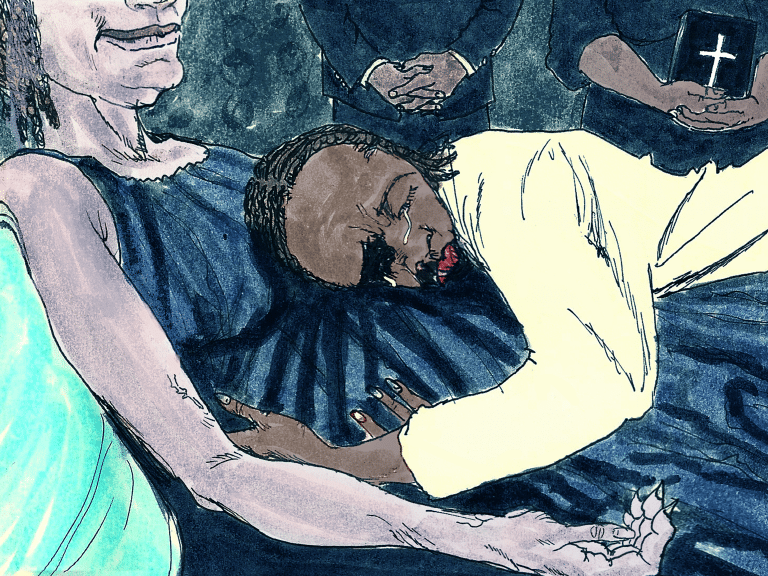
Image by Johannes Eisele/Getty Images, © All Rights Reserved.
A Child’s Memories of Hiroshima
I’ve been noticing that people just don’t think about Hiroshima very much anymore. If they could mark August 6th on their calendar each year, just to be aware and remember Hiroshima and what it meant to the human race. It has to do with the whole question of death.
August 6th, 1945 was a beautiful day, and it was a happiest day for me because I had just persuaded my parents to bring me back the day before, to be with them, to be home in Hiroshima. I had been evacuated to a remote village. We think of evacuation of the British children, but we hardly think of Japanese children being evacuated. We’re both small islands.
My grandfather, who had passed away a couple of years prior to that time, was an industrialist and had a large estate. We lived on this estate, our family and my father’s elder brother’s family, surrounded with beautiful, beautiful gardens, one mile away from the center of the town. So there was this dire contrast of the happy, peaceful, unsuspecting lovely morning suddenly turning into … entire destruction of all that was there … for me. The fire, the burning, the crushing…
On that day, my mother had to go off to take care of business in the center of town. My cousin, who was like my brother, was also in the center of town. My father was away at the harbor of Hiroshima, so he was a few miles away from the center. I was in my room. First there was a warning that a few planes were on their way and then the broadcast said, “Emergency is off, you can go back to work,” or whatever you were doing. So the people who were outdoors, a lot of them even took their shirts off. It was very sunny — a beautiful blue-sky day.
I was ten, going on eleven. I had just come home the night before, so I was catching up on reading that my cousin gave me which had something to do with a Samurai duel — a boy’s book. Then I had a little stomach trouble. My mother left me a little porridge to have. There was this simultaneous flash preceding the humongous sound of explosion, the kind of intensity that I had never heard before or heard since. And then there was the breaking down with the force of the wind and the shaking of the earth and the house breaking up. And then being covered with debris. The thing lasted for, I thought, an unending, infinite length of time. It was pitch-dark and I was just getting hit with all kinds of objects falling down on me.
Even as a child it was the very first time in this midst of abyss, I said to myself, “I’m going to die.” When I said that, something very quiet came through, and I wasn’t completely falling apart — that was sort of curious to remember. It didn’t end, the thermal wind and the force. It just went on and on and I thought it would never end. The words coming into my mind saying: “So this is dying in a war. I’m going to die.” I was the one who was most surprised when it all ended finally. Everything became still, I found myself still alive and living and breathing … yeah.

It took some great effort to get out because I couldn’t really move. Somehow, after I managed to get out, I saw the total changed scenery outside. First I thought there should be a great big crater in the middle of my grandfather’s garden because I thought it was a direct hit by a huge bomb of some kind. There was no crater. So I stepped outside. Our house was raised up like a castle. So I stepped down to find people who were injured and the houses had collapsed and everything. Everything inside was just rubble. The first people I saw were two women and they were on the ground. Their clothes were bloodstained, and they were asking for help. There were others in the house trying to get out. They were covered with soot and hair all messed up, and later on I started to see en masse people who were hurt and burned.
I think we were all in a state of shock. All of us were raised in a culture that valued perseverance, not calling out with one’s discomfort — that was frowned upon. So you persevere, and virtue is to try to cope with whatever comes along. You’re not supposed to cry out with pain. Some people who just couldn’t help it would say something, but for the most part people were very silent. They were whispering, like people who couldn’t breathe, people who needed to be helped out… [softly] “Please help me …” And that’s much more painful to remember, because you know they were in dire agony. I think my sensation was sort of like a frozen statue. I knew we were at war, and that this was part of the destruction of the war, but I didn’t know what happened. I kept on hearing explosions. I think ammunition was exploding at the military base. Every thirty seconds. The whole city kind of smoking up and people coming out in this horrible condition.
So all I did was try to follow my mother’s instruction — my mother, who was afraid that incendiary bombs would surround us. She always taught me, “Get away and go to the river.” The river Ota had seven branches, so there were plenty of rivers around. I tried to get to the river. People were already trying to jump into the water and drowning because they were just burnt to death practically, but they were still alive and trying to relieve the pain of their burns.
I had no idea where my mother was, and had I known, I probably wouldn’t be here talking to you because I would have gone where she was. Absolutely nothing would have prevented me. As it turned out, she was crushed and burnt to death. Under a house near the center. I would have died with her. I really would have stayed there, I wouldn’t have left her. There was no way I could find her because I didn’t know where she was.

After that very day, all of us went back looking for our kin. Most of us didn’t know where they were. So we had to go to rescue stations. A lot of these were just people lying on the ground, dirt, or floor of a chapel of one of the temples. I just couldn’t stand going by — person, person, person … So I would announce my mother’s name and then say, “Oh, please answer me,” and no one would answer but sort of stir … Even if I was so much in a state of shock and desensitized myself, I tried. I just couldn’t stand it, thinking I can’t find her, I can’t find her, what am I going to do? I want to see her, but I don’t want to see her in that condition. But if I can let her know that I love her and that I want to be there…
So, just playing with magical things in my mind, I started to sing some songs that she taught me, that she loved hearing. [With a touch of happiness] So I said:
“Please, God, carry this tune to my mother and comfort her, because I can’t find her.”
That’s when my feelings came back and I just cried and cried and cried. But those are the scenes that all hibakusha, the survivors, were subjected to. The powerlessness of not being able to help or participate because we didn’t know what dropped. Even those people who didn’t have any burns and injuries started to suffer and drop dead because, you know, the radiation, how forceful it was there. It goes into the marrow of your bones and penetrates your brains and then changes your fetus, and malformed children are being born. We had no idea how to help ourselves or help anybody. So that kind of death is annihilation and death without dignity. Complete powerlessness. Not even a person being there, torturing you. It’s invisible. Done to people, DNA, plants.
I gave you the four-leaf clover I picked. Just all over the bank of the Ota River. The clover’s changed — to five-leaf, six-leaf, all over. I know —I picked them. Their DNA changed, for sure. Even people who weren’t at the center, if you got wet with the black rain, [*Black rain — rain mixed with ashes from incinerated material and radioactive fallout — fell after the bombings of both Hiroshima and Nagasaki.] it stuck to you — and we didn’t know what it was. And all of us had to carry this — not just the biological effects, but mentally. For the longest time, it haunted me and tortured me. I think practically most of my young life. Even into my forties and fifties. Until I came to work in this hospital and saw death with dignity. I was trained in psychiatric services with many people, for this very precise challenge of understanding death.

I nearly died with A-bomb sickness at the time. I ran the highest kind of fever for days and I was delirious. I was out of commission for months. How did I recover? It was very slow. The peak time, when I was worst off, I wasn’t expected to live. My father’s younger sister came with a few living snapping turtles because she believed a living turtle saves a person’s life. And my father and she struggled to sever the heads of the turtles with a decanter underneath it to catch the dripping blood. They made me drink it. Afterwards they made soups from it and they made me eat them. Probably the proteins from it were very helpful because most of us were starving. My fever started to go down. I didn’t go to school the year after that. My best friend who was evacuated in the same class and also came back with me on the 5th of August — she was crushed to death. We were from the same village, same temple.
My brother-cousin, his body melted, he was burned to death. He was alive for several hours and somebody who saw him told us that all his clothes, including his outer skin, were gone, burned, scorched. He had lead bindings over his pants. Parts of that still remained, but everything else was burned.
Something in my gut, especially when I think about my mother and my cousin, how they met their end, something happens … It’s a terror and it’s a grief combined. And all of us who were there and who survived carry the imagery from it, the guilt. Grief is that you lost them and another grief is that you weren’t there, you were powerless; you didn’t understand what was happening; you were not warned; you weren’t prepared. So, if you love your mom or if you love your brother, you wish that you could have done something, and even if you couldn’t do it, you wish you could have been there to tell them, “I love you, I’m sorry we can’t do anything about your pain, but I am here …” We couldn’t even give aspirin… we didn’t even have aspirin, so what am I talking about?!
We couldn’t even give water. In Japanese ritual, when a person is near death we always moisten the lips with cotton or something. Those burned people were begging for water. We couldn’t give any water. People said, “If you give water, they’ll die, so don’t give it to them.” You survived but they didn’t. People went around saying, “Oh, so-and-so died, and so-and-so died.” And then my grandmother was there. “Hey, you make it look like all the people who died were good, but those of us who survived aren’t.” And there was something to that, because we didn’t feel good about having survived.

My uncle developed some kind of a swelling at the place where he had a gashing-open caused by glass. He was under my grandfather’s factories that crushed him. It turned into brain cancer and he died. The aunt who wasn’t there but brought me the turtle that helped me to survive — she was so close to him, and she died of grief. My other aunt, who was an older sister to that aunt, also died after taking a bath. My grandmother complained about abdominal pain for a long, long time, and then died also. My father, who lived for, oh, into his early sixties, he wrote me a letter and said:
“I am so tired every day, it’s an effort.”
And several days later I had a phone call: my father passed away. A lot of us had what other people called “lazy sickness.” We were always easily tired, fatigue-prone. And we were cancer-prone. Some of the mothers gave birth to small-headed babies, so single women hid that they were survivors because, in those times, marriages were arranged. If you had a chance of giving birth to a defect baby, you were an employment risk, a marriage risk. You were vulnerable to unknown illnesses.
During the [American] Occupation, the press couldn’t release any findings of these illnesses. They were not allowed to publish anything. So nobody really knew what was going on, and there was no treatment. Plus the fact that this was the first time the Japanese were defeated. And it was such a horrible war, and we suffered so much. Nobody wanted to be reminded of it.
Oh yes, it’s etched in my mind like it happened yesterday. There is no way I can erase it, no way I can erase all the drenching memories and the terror.
I was driven by fear most of my life because of this — because I connected, identified death as annihilation. There was no respect to it. The memorial, the Peace Park, all of this, fine — but I saw it, I lived it. You cannot fool me that this is not awful, OK? I have to quicken myself to tell you that I don’t feel the same way about death today.

This happened by an accident — I was led, like by the hands of fate, guided into this setting. My very first experience in terms of near-death conditions, my assignment was transplant. This was 1987. Fate is that my kids went to the Lab School, [*A highly regarded private school, part of the University of Chicago complex.] and I needed a place to work. I said, “I’ve got to find work here on the campus” — and my first assignment at the hospital was a liver transplant. So I put on my sterilized gown and walked into intensive care, where a patient who had the transplant came out of the surgery. It’s very serious, life-threatening surgery. I saw this person connected up to every possible life-support machineries, OK? My reaction to that was: How wonderful! Everything is being done to sustain this person’s life in honor of her life. Unlike those people who were dying without aid, out on the dirt, on the floor, and no medicine, no food, no water. I said, “This is so restoring to me, that this can be done for human beings.” For me it was a privilege to be a part of that effort to sustain life. The unfinished business and the regret that I could not help in Hiroshima, here totally different possibilities exist to honor human lives.
I began to let myself feel a little bit what I had been trying to suppress for years. I couldn’t really look it in the eyes — I was too terrified. But after I saw other possibilities, I began to be able to start my process of how to think about death.
It didn’t happen overnight. I trained with Elisabeth Kübler-Ross, I trained with Milton Erickson, I trained with Ken Moses. There was so much grief connected with my thinking about death. I was able to bring up the dreams that were shattered, questions unanswered because my mother died so suddenly and to express, really truly and fully, what had been on my mind for years and years. But you can’t really share, maybe because I’m Japanese and very reserved when it comes to very private feelings.
My patients were the teachers, really. Like young women with young babies or children, feeling such great grief that they can’t die, they can’t leave these young ones behind. And I could feel how my mother must have felt, even momentarily: I cannot die, I cannot leave this child. It was so good to feel that it’s a two-way thing. To lose a parent is hard, but for a parent to go is even harder.
Every single human being I met here who called themselves patients and allowed me to enter their lives and share in their deepest thoughts and feelings, I experience it. I’ve lived a thousand lives already, all of which enriched mine. Yeah. OK, here is what I learned from my patients: It’s terribly important for us to have death with dignity. In annihilation, you have no preparation. Annihilation is simply a torture. What death means is saying good-bye to all your attachments, including things, but most importantly to bonds to people. For the person who’s left, it’s saying good-bye to that person, but for the person who’s going, it’s everything, it’s global, saying good-bye to all that.



Share your reflection